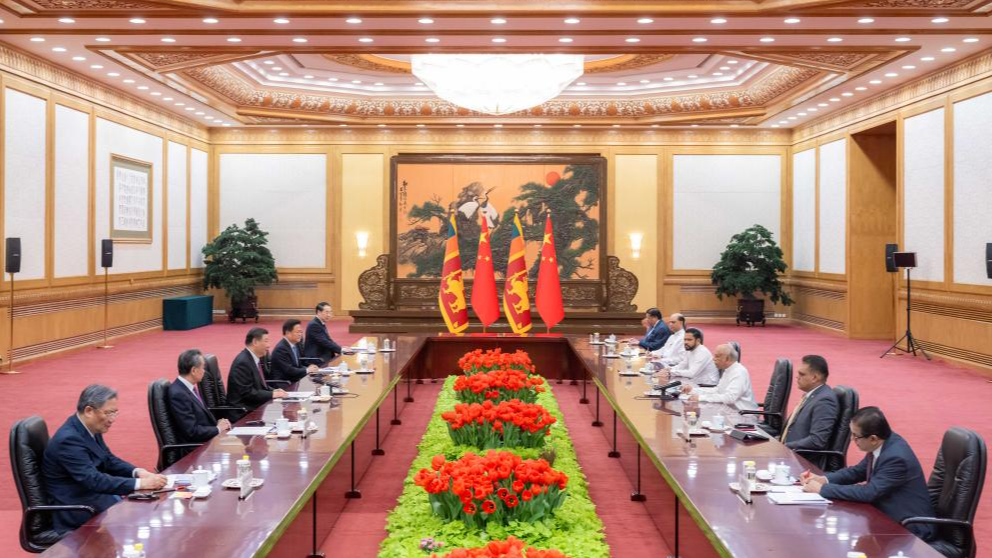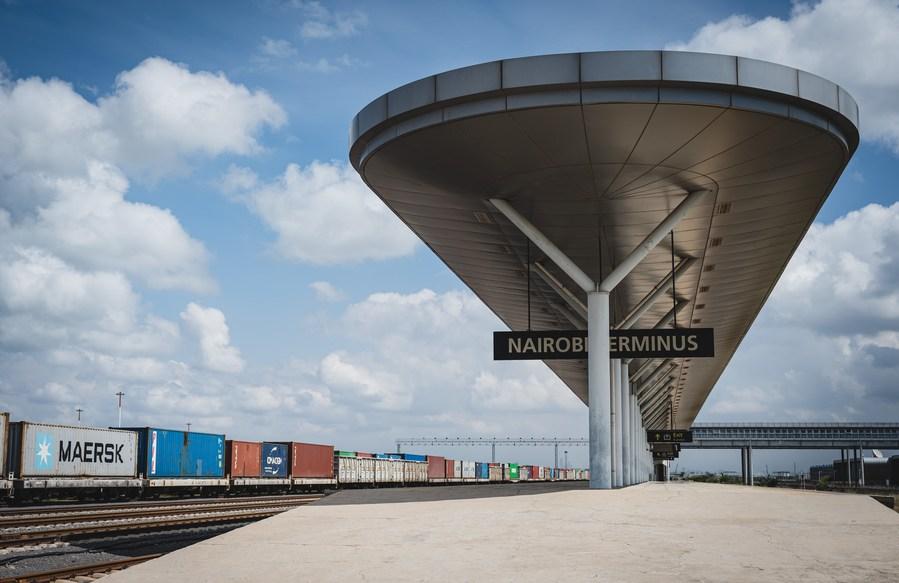
Chinese President Xi Jinping meets with Sri Lankan Prime Minister Dinesh Gunawardena, who is on an official visit to China, at the Great Hall of the People in Beijing, capital of China, March 27, 2024. [Photo/Xinhua]
By Xin Ge
In recent days, leaders from countries in the Global South, such as Sri Lanka, Dominica, and Nauru, have visited China, marking a "frenetic week of Global South diplomacy," and underscoring China's burgeoning influence among these countries.
Chinese Foreign Minister Wang Yi earlier this month specifically stressed the status and role of the "Global South" at the press conference of the annual National People's Congress. He pointed out that as a collective of emerging markets and developing countries, the "Global South" now takes up over 40 percent of the world economy, profoundly reshaping the global economic terrain.
Independence and self-reliance serve as the bedrock of the "Global South," while unity and self-improvement remain integral to its ethos. Rather than the "silent majority," the Global South has become a pivotal force in reshaping the international order.
As the world's largest developing country, China has encountered common development challenges and tasks, shares historical experiences with other developing countries in fighting against struggles, and extends similar views and demands on the current international order and global governance, making it a natural member of the "Global South" family.
China's formal engagement with Global South countries can be traced back to the Bandung Conference of 1955. At this event, China not only proposed the principle of "seeking common ground while reserving differences" as a means of communication among Global South countries but also successfully incorporated the Five Principles of Peaceful Coexistence into the "Ten Principles of Bandung."
Regarded as the genesis of South-South cooperation, the Bandung Conference fostered a foundation of mutual respect and mutual benefit, facilitating resource, technology, and knowledge exchange within the Global South. Under the framework of South-South cooperation, China's collaboration with developing nations hinges not only on the willingness and efforts of all parties but more crucially on how these nations leverage such cooperation to address their domestic needs, thereby yielding long-term benefits for both parties.
In August 2023, during his address at the closing ceremony of the BRICS Business Forum, Chinese President Xi Jinping emphasized China's commitment to its role as a member of the developing countries and the "Global South." He affirmed, "China breathes the same breath with other developing countries and pursues a shared future with them. China has resolutely upheld the common interests of developing countries and worked to increase the representation and voice of emerging markets and developing countries in global affairs."
Indeed, China has actively engaged and advocated within international institutions such as the United Nations and the World Trade Organization, striving for the establishment of a fairer and more just international order, while safeguarding the collective interests of developing countries.
Moreover, the Global South provides ample opportunities for China to expand international cooperation. China extends development assistance to over 160 countries, collaborates with more than 150 nations in advancing the Belt and Road Initiative (BRI), and fosters South-South cooperation through multilateral platforms such as the China-ASEAN Cooperation Mechanism, the Forum on China-Africa Cooperation, the China-LAC Forum, and the China-Arab States Cooperation Forum.

A platform of the Mombasa-Nairobi Railway in Nairobi, Kenya, May 23, 2023. [Photo/Xinhua]
Additionally, China has established the Global Development and South-South Cooperation Fund, with a total amount of $4 billion, to jointly promote Global Development Initiative with over 100 countries and international organizations.
Taking the BRI as an example, over the past decade, China has signed cooperation documents with more than 150 countries and over 30 international organizations, hosted three Belt and Road Forums for International Cooperation, and established over 20 multilateral cooperation platforms across various fields. From 2013 to 2022, the cumulative total of imports and exports between China and BRI partner countries reached $19.1 trillion, with an average annual growth rate of 6.4 percent.
Moreover, the cumulative two-way investment between China and these nations surpassed $380 billion, with China's outbound direct investment exceeding $240 billion. In the meantime, the value of newly signed contracts and completed turnover of contracted projects in BRI partner countries reached $2 trillion and $1.3 trillion, respectively.
China's governance experience and development model have also emerged as significant topics in global development discourses. Serving as a comprehensive theoretical framework, Chinese modernization presents an alternative to the Western-centric approach, challenging the dominance of Western theories and practices in modernization.
Chinese modernization has the potential to inspire countries in the Global South to customize their development trajectories according to their unique national circumstances. By doing so, it fosters a sense of empowerment, imbuing these nations with the confidence and resolve to navigate their own paths toward independent modernization.
Xin Ge, a special commentator on current affairs for CGTN, is a research fellow at the Institute of Public Policy and Governance, Shanghai University of Finance and Economics (SUFE), and associate professor at the School of Public Economics and Administration, SUFE.

 中文
中文



